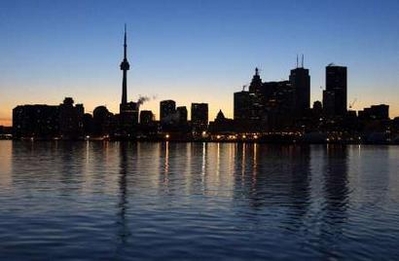
The Toronto city skyline, normally aglow with lights from office buildings, is seen dark during Earth Hour in Toronto, March 29, 2008. Non-essential lighting in government and office buildings as well as residences were turned off for one hour to publicize the effects of climate change.(Xinhua/Reuters Photo)
From city landmarks as Toronto's CN Tower and Montreal's Mount Royal Cross to government offices, from businesses to residences, Canadians turned off their lights from 8:00 to 9:00 p.m. Saturday to join the global Earth Hour movement in an attempt to raise awareness about climate change.
The four Atlantic provinces were the first to go dark Saturday night, with businesses, governments and households dimming their lights.
In the largest city Toronto, much of the downtown core went dark as Mayor David Miller pulled a ceremonial switch in Nathan Phillips Square to dim the lights at City Hall shortly before the hour approached.
Canadian Grammy-winning singer Nelly Furtado then led the thousands gathered in the square in an acoustic version of her hit song "Turn Out the Lights."
The CN Tower soon darkened in the city's skyline, along with high rises, sports arenas such as the Rogers Center and Air Canada Center.
Meanwhile, in restaurants across the city, people dined by candlelight.
In national capital Ottawa, the Peace Tower and its four-faced clock above Canada's Parliament faded to black.
An estimated 55,000 Canadians from 150 communities across the country took part in the event, with the number just behind the United States and ahead of Australia. But according to poll done recently, 70 percent of Canadians said they planned to mark the hour.
The event is not expected to generate much in the way of actual electricity savings, but will hopefully power awareness, said climate activist John Bennett, who marked the occasion himself with his wife, a bottle of wine, some sushi and candles for lighting in Ottawa.
"We're hoping to demonstrate, especially to our political leaders, that Canadians are prepared to make the changes necessary to meet and deal with the climate crisis," said Bennett of climateforchange.ca.
Twenty-six major world cities and more than 300 other cities and towns signed up to participate in this year's Earth Hour, organized by the World Wildlife Fund.
Organizers expected more than 100 million people would take part, eclipsing last year's single-city debut, when 2.2 million people and more than 2,000 businesses in Sydney shut off lights and appliances, resulting in a 10.2-percent reduction in local carbon emissions during that hour.
(Xinhua News Agency March 30, 2008)